One in every five people in Honduras are in poverty.
Triggered by the government's Conditional Cash Transfer (CCT) program, a model to "graduate" from poverty was developed to improve livelihoods, and is now spreading all over the country.

Project Name
Project on Life Improvement and Livelihood Enhancement of Conditional Cash Transfer Beneficiaries through Financial Inclusion
February 2015 - April 2020
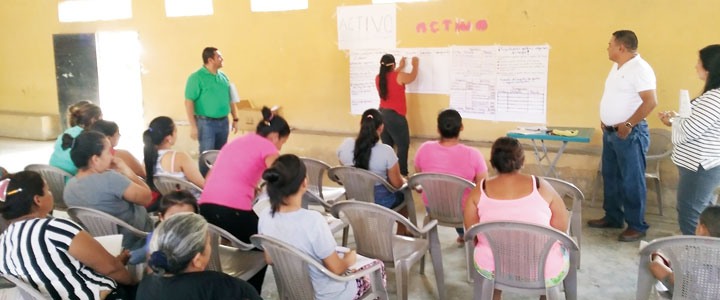
"See the flow of money at a glance with household budget account books!"
Household budget management training on how to keep a household budget account book.
In Honduras, about 16% of the population live off less than about $1.9 (about 214 yen) per day [1] . There is a Conditional Cash Transfer (CCT) providing livelihood assistance for the poorest groups to reduce poverty, but some households are unable to remove themselves from poverty even after receiving the benefit from CCT. JICA began a project in 2015 at the request of Honduras that "we would like your cooperation in creating a system to effectively use CCT to eliminate extreme poverty." The targets were about 2,000 households receiving CCT in five target cities. It was decided to create a Honduras version of the "Graduation" Model that has been used to reduce poverty in other countries, and to set goals for its spread.
Note
- [1]Source: World Bank, 2018 (amount based on purchasing power parity in 2011).
Elimination of income instability
Mr. Akihiro Tsukamoto of the "Kaihatsu Management Consulting" Inc. that was entrusted with this project by JICA says that "the feature of poor households in this country is instability." "They aren't completely without work, but many people don't have stable work and have differences in their income from month to month. For farmers, income varies depending on whether it is harvest season. And yet, as soon as they receive CCT they impulse buy and purchase too much food, wasting their money… There are too many people that have no plan for how to spend their money."
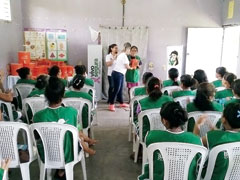
Saving promotion activities implemented with the cooperation of financial institutions.
In response to this, this project aimed to help people to "graduate" from poverty in three steps. The first step is household budget management. Given that most of the beneficiaries were women that keep the household budget, first training was held about how to manage household budgets by keeping household budget account books so that they could see at a glance how much they were spending. Some people were surprised when they saw how much money they were spending on cola and sweets.
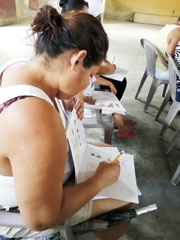
"Set goals and save well"
Setting savings goals and writing them down to make saving a habit.
The second step was savings. Even poor households can save money if they can manage their household budgets. "We tried to get them to understand that by preparing for future expenses by making saving a habit, it can be possible to survive even with some degree of instability in their income." At the same time, with the cooperation of local financial institutions, financial education was provided and business trips were made to open accounts in areas where there were no financial institutions. Also, an environment was created to make it easy to save by encouraging the institutions to reduce the required amount of deposits for opening an account.
Kaihatsu Management Consulting, Inc. Director, MSME development department
Mr. TSUKAMOTO Akihiro
"In the early stages of the project we were in charge of the training, but soon thereafter staff from each of the city halls took the lead in carrying out the project."
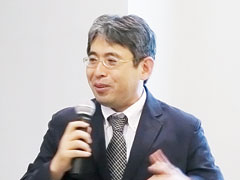
Mr. TSUKAMOTO Akihiro
Completion of the "Graduation" Model
The final step was to use savings to launch small businesses. A variety of businesses were tried, such as bakeries, barber shops and home delivery services for household detergents etc. According to Tsukamoto, "Because they saved the money themselves, they are more serious about it. And even if they fail, they now have a habit of saving, so the next challenge is also possible." By women starting businesses household incomes were increased, and this also had the effects of building connections with society and promoting independence.
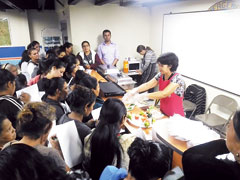
A lot of women gathered for training to prepare for the opening of a business.
At the same time, financial institutions were asked to develop small loan products for low-income groups. Fredy Moradel, the Finance Director of the Federation of Savings and Credit Cooperatives of Honduras (FACACH) which controls credit unions nationwide says that the credit unions cooperated in the spirit of mutual aid. "The small loans and entrepreneur loans developed in this project became an important business for us as well. As financial institutions we are also involved in entrepreneurial education and training to increase the number of people getting out of poverty." So far more than 13,000 loans to the poor have
This "graduation" model is referred to locally as ACTIVO [2] . Recognizing the effectiveness of ACTIVO, the Honduras government spread it nationwide from 2019. Mirta Maradiaga, Vice-Minister's Adviser of the Vice-ministry of Social Integration, which is in charge of the project, strongly commented that "we found that household income can be increased by the appropriate management and small business." We will continue to strengthen cooperation with the social workers that care for poor households, financial institutions, and NGOs etc., to ensure that participants do not return to poverty. There have been delays in some activities due to the impact of the spread of the novel coronavirus, but we will continue to steadily move forward.
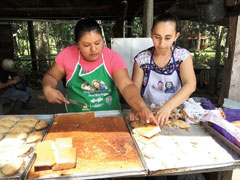
"Baking delicious bread!"
A bakery started through the project.
Note
- [2]Taken from the meaning of "Ahorro, Cuenta financiera,Trabajo e Ingreso para la Vida Optimizada (savings, accounts, work and income for a better life)" (Spanish). Also includes the meaning of actively forming assets.
Federation of Savings and Credit Cooperatives of Honduras Finance Director
Mr. Fredy Moradel
"One year has passed since the project began. Thinking that we particularly wanted to support financial education, we hired new experts in financial education and entrepreneur development, to reinforce ."
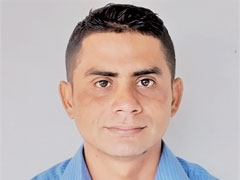
Mr. Fredy Moradel
Vice-Minister's Adviser of the Vice-ministry of Social Integration
Ms. Mirta Maradiaga
"In 2021 we want to further increase the number of households applying ACTIVO model. So we are continuing with the project in cooperation with many institutions throughout Honduras."
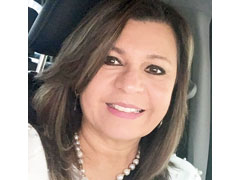
Ms. Mirta Maradiaga
Spreading the ACTIVO model to Honduras
Spread to 88 cities

- 1 . STEP 1 Introduction of household budget management
- 2 . STEP 2 Saving at financial institutions
- 3 . STEP 3 Improving livelihoods through small businesses
- 4 . Graduation!
Improving distribution and livelihoods with paved roads
Project Name
Rual Roads Improvement Project
In Paraguay, nearly 80% of roads are unpaved and the conditions sometimes get even worse during the rainy season when the roads can get shredded. This blocks the flow of distribution for the key agriculture and livestock industries and puts limitations on access for many citizens unable to go to schools or hospitals etc. Thus, there was a strong demand in rural areas for immediate road development.

With the cooperation of the Ministry of Public Works and Communications in Paraguay and JICA, approximately 150 km of roads across three eastern departments were paved and 27 aging wooden bridges were replaced. The priority for development was set up, following the opinions of local governments and residents, and based on traffic volumes and agricultural production, and the presence of public facilities, etc. Resulting from this, traffic volume increased by 60% and travel hours were shortened by 40%. In addition, agricultural products can now be delivered to the market promptly throughout the year, which has had a significant impact on increasing local incomes, revitalizing the market, and improving access to health care and education, etc.
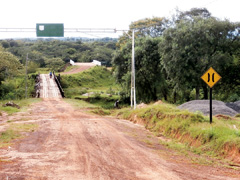
Many unpaved red clay roads spread across the country get muddy when it rains.
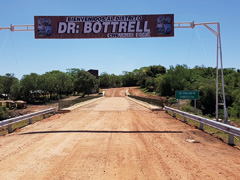
Road paved with sand and pebbles (gravel). Its surface is stable because water is not collected even when it rains.




scroll